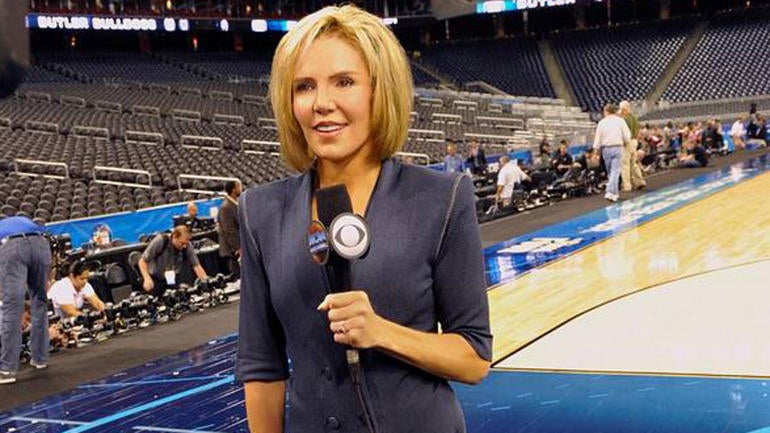
Sports journalism legend Lesley Visser received a call no woman has ever received before. She picked up the phone about a week ago and found out that she would be the first woman to be honored with a Sports Lifetime Achievement Award at the Sports Emmy Awards. This is far from her first "first." She has set the stage for women in the field for the last 45 years. This achievement just further cements her status as a trailblazer.
Visser's lists of "firsts" is truly exhaustive:
- First woman ever enshrined in the Pro Football Hall of Fame
- First woman to report from a Super Bowl sideline
- First woman to cover the NFL as a beat
- First woman on "Monday Night Football"
- First (and only) woman to present the Lombardi Trophy at the Super Bowl
- First woman on a Final Four broadcast
- First woman on a World Series broadcast
- First woman on a NBA Finals broadcast
Her resume reads as unbelievable as it does inspirational, and she is continuing to add to it.
Visser described her emotions when she got the Sports Emmy call to CBS Sports, saying she was, "Overwhelmed, completely overwhelmed."
The award is a full circle moment for her. The first ever recipient, Jim McKay, is someone she worked with while covering Triple Crowns and he is the father of current CBS Sports Chairman Sean McManus. McManus is the one who called her and told her she would be getting the award.
"For me, I feel privileged that I got to work a little bit with Jim McKay and now I work for Sean McManus," she said. "I think I blithered when Sean called me. Matter of fact, I'm 100 percent certain I did."
She emphasized that she could not be more honored and was wowed by the company she was in.
"It's astonishing. I worked with half of them, and the other half I idolized," she reflected. "It's very, very meaningful to be the first woman to win a Lifetime Achievement Emmy."
Our Lifetime Achievement Honoree, Lesley Visser, has led quite an accomplished career of firsts. pic.twitter.com/0prEzsdVze
— Sports Emmys (@sportsemmys) February 19, 2020
Before becoming a trailblazer in the industry, Visser was just a kid who loved sports and wanted to be around it. Recalling a vivid memory she has from when she was just 10, she says her mother asked her what she wanted to be when she was older.
"I have such a distinct memory, we were crossing a street and my mom said to me, 'Well, what do you think you want to do when you grow up?'"
When Visser said she wanted to be a sportswriter, a job that did not exist for women at the time, her mother did not respond with doubt, but rather encouragement and a piece of advice that later became the title of Visser's book.
"Instead of my mother saying, 'Oh girls don't do that, girls can't do that', she said, 'That's great. Sometimes you have to cross when it says don't walk.'"
At the time, saying she wanted to be a sportscaster was like saying she wanted to go to the moon, or live on Mars.
"You can change a child's mind with a sentence," she said, looking back on how that moment at the crosswalk with her mother shaped her future.
Visser has since spent her career crossing when it does not say walk, coming up with creative ways to access players when game credentials noted that women were not allowed in the locker room or press box.
Another First.
— CBS Sports PR (@CBSSportsGang) February 19, 2020
Congratulations to our Lesley Visser on becoming the first woman to receive the Sports Lifetime Achievement Award at the Emmy® Awards in April. @sportsemmys pic.twitter.com/YsybA6VpnA
She remembers her time covering the NFL, as the first female beat writer in the league, saying there was not even a bathroom for women in the press box. She at times had to conduct her interviews in parking lots of stadiums, where she waited for players, and had to create her own playbook for how be accepted as a woman in the industry.
Now, she mentors young journalists and says there are three qualities everyone going into the field should have.
The first is passion.
"If you don't love it, don't do it, because it will come out somewhere," she says.
Sports journalists also need knowledge, something many questioned Visser about at first because of her gender. When doubted, her response was always, "Men do not have a genetic blueprint that allows them to love or understand sports. They learned it just like we did. You weren't born recognizing a safety blitz."
Stamina is the third crucial element, according to Visser. Her willingness to continue innovating and help pave a path for others is clear when you take even a glance at her achievements, which all have led to the one she will be honored for on April 28.
Her exemplary career and the memories she has collected at iconic events over the years have not taken away how humble she is. Visser laughed off the idea of having a legacy people will reflect and look back on.
"That's for other people to say," she said, adding that people will likely be focusing their energy on more important figures.
However, for women in sports, Visser is the important figure. She is the one who fought battles -- sometimes silently -- so others did not have to.
What Visser is most proud of is the way she handled the challenges throughout her career -- and there were many. Her approach has always been to keep an "attitude of gratitude."
The sports media scene for women is much better than it once was, thanks greatly to Visser. She has watched the world come together for women in the industry and is thrilled with what the future, one she helped create, looks like.
"You can do anything you want," she said. "You can be a writer, you can be a commentator, you can be a coach, you can own a team. It's so thrilling to me that everything's available."





















